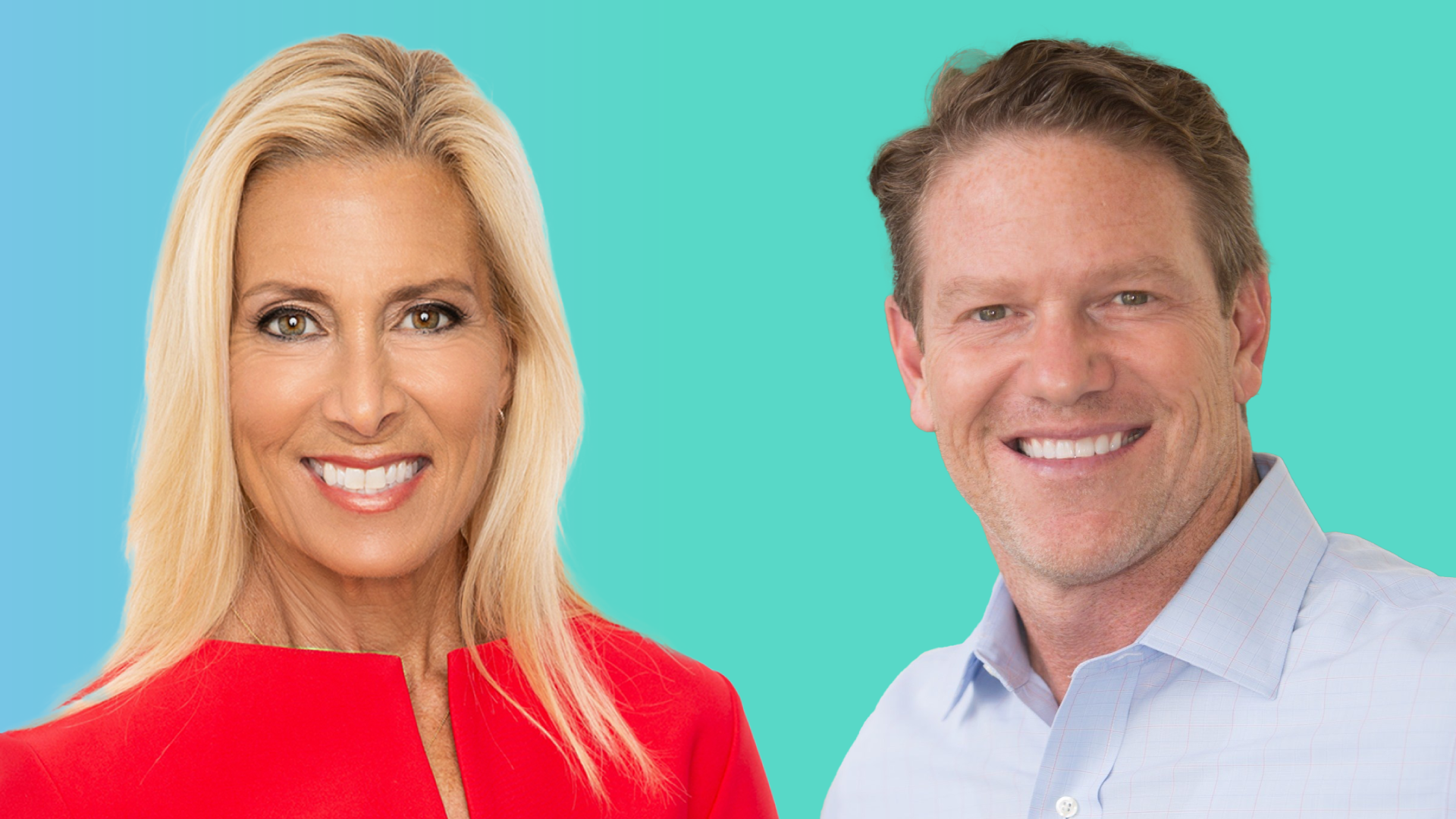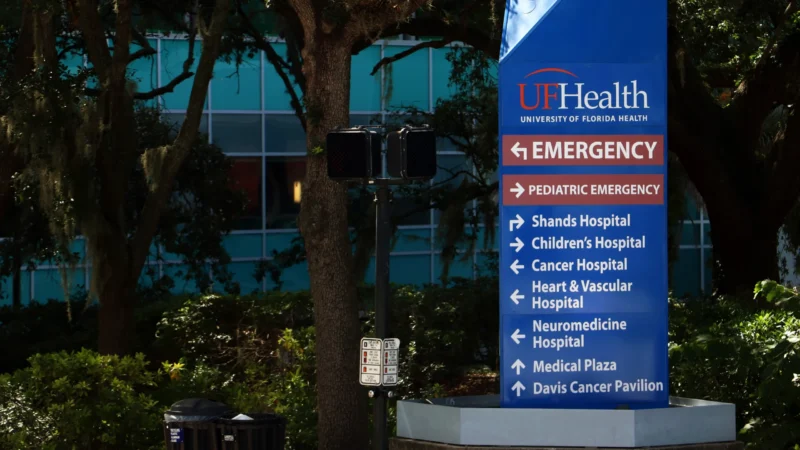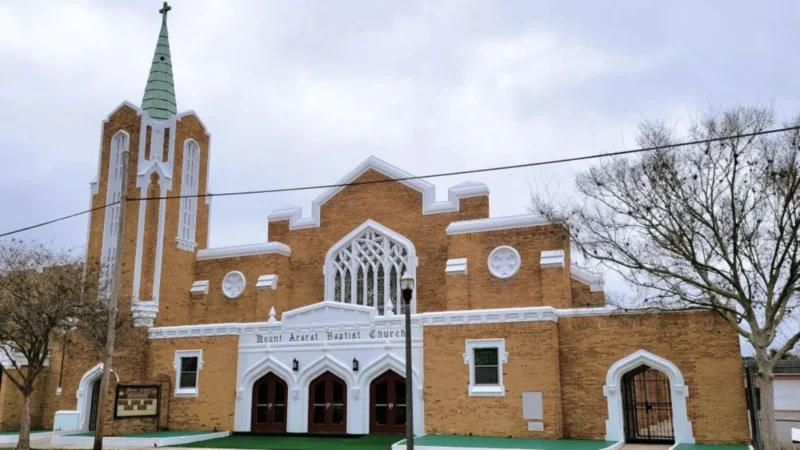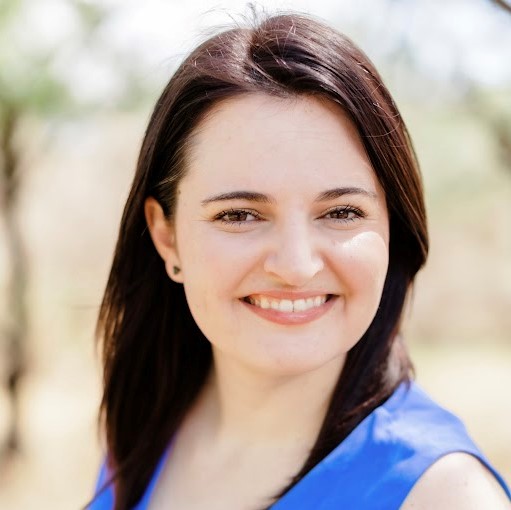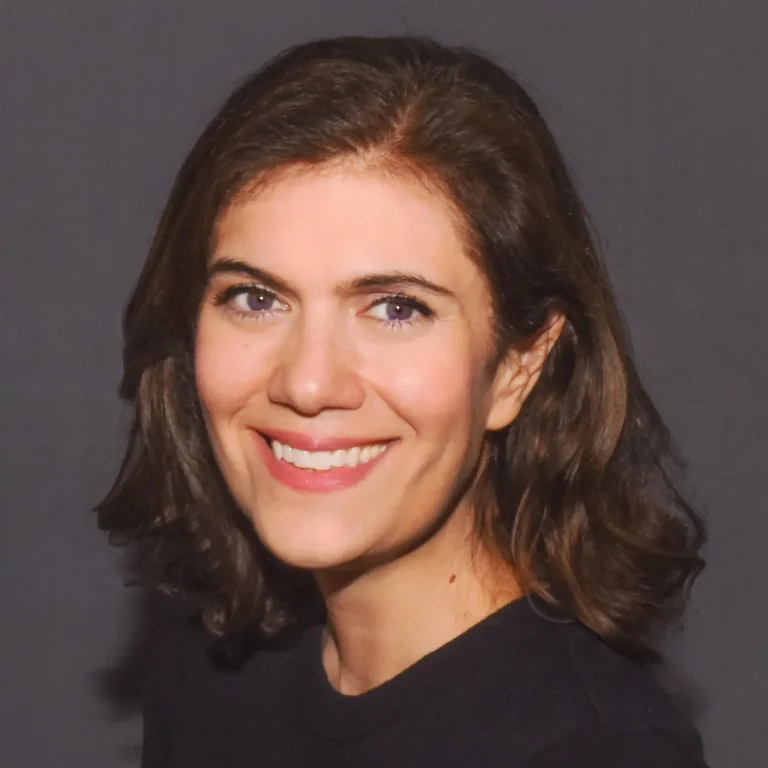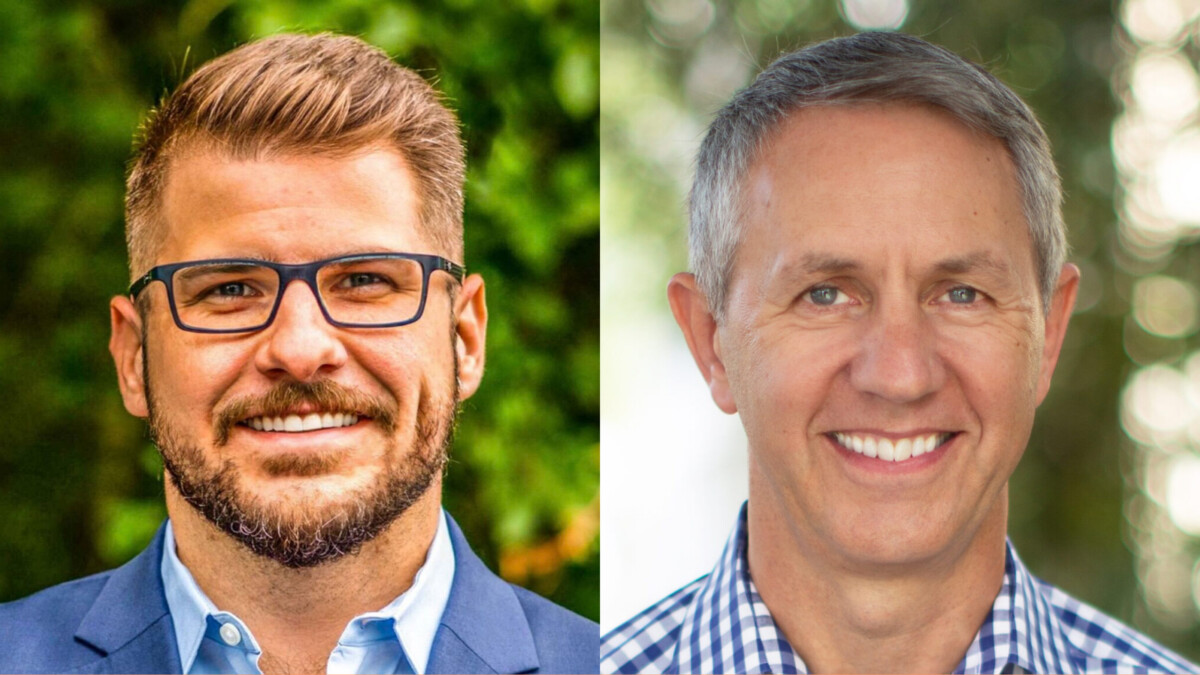After the March elections, Jacksonville’s mayoral race is going to a runoff: Jax Chamber CEO Daniel Davis, a Republican, against charity founder and former TV anchor Donna Deegan, a Democrat.
Meet the candidates
In their only televised debate on April 20, Davis and Deegan agreed on many issues, including the need to add more police officers to the streets, increase funding for phasing out septic tanks and attract more residents and businesses to Downtown Jacksonville.
One area where the two differed was on Confederate monuments: Deegan said she would emulate current Mayor Lenny Curry and allocate city money to remove the monument from Springfield Park; Davis said he would not.
Davis, a former City Council member and state lawmaker, says he’d be a strong partner to Sheriff T.K. Waters, who has endorsed him, and he highlighted his experience attracting business to town through the Chamber. He listed his priorities as crime and infrastructure.
Deegan, who would be the city’s first female mayor, framed herself as a voice of opposition who will clean up what she asserts is a widely viewed culture of corruption in city government and bring in those who have historically been “left behind” when it comes to economic development. Her priorities are infrastructure, public health and small business.
Read on for the candidates’ thoughts on the entire range of issues — the Black Lives Matter movement, panhandling, veterans’ services and more.
Candidates are in alphabetical order. Answers are from the debate hosted by the University of North Florida and Action News Jax on April 20. Some answers have been condensed for length or clarity.
Daniel Davis, REP
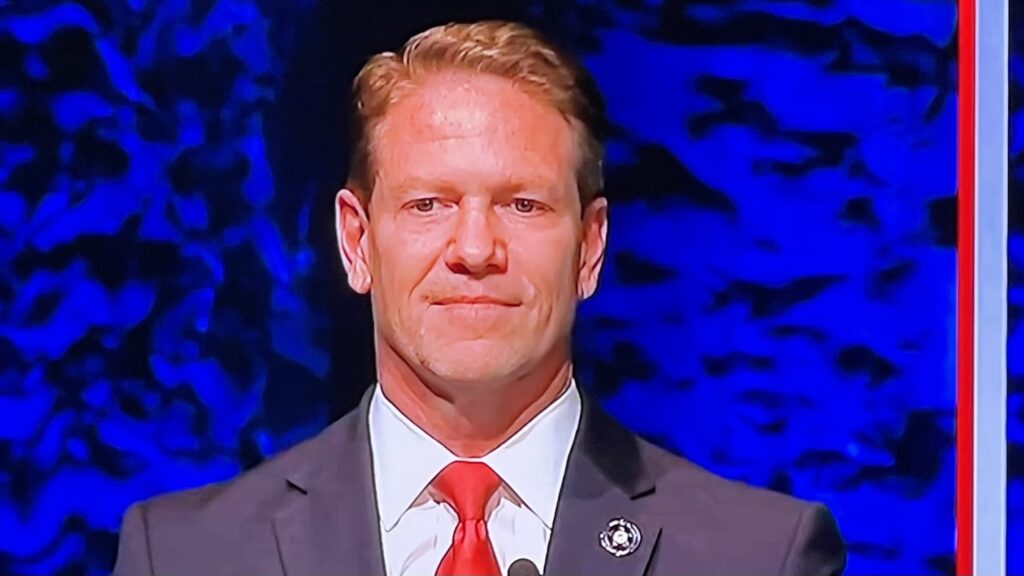
Candidate bio: Davis was executive director of the Northeast Florida Builders Association, Florida’s largest local membership trade association representing the building and construction industry, for 14 years. For the last decade, as CEO of the JAX Chamber, he has served the business community. He previously served on the Jacksonville City Council and was elected president of the Council in 2007 — the youngest person to serve in this capacity. He also served for four years in the state House of Representatives representing District 15, which encompassed parts of Duval County. (Info from Davis’ campaign website)
On top priorities: “Crime is the most important issue. We’re going to put more officers on the street, we’re gonna make your streets safer. We have to make sure that we provide more infrastructure for the citizens as well. I believe in a smaller government, and making sure that we take your tax dollars and we get them back out on the street for you, because that’s what government’s supposed to do. … What I’m going to do as your next mayor is to make sure we stay focused on how we spend your money: make sure we put more officers on the street for you and make sure we spend your hard-working tax dollars back in your neighborhood for the infrastructure that you need.”
On public safety: “As City Council president, I led the charge to add a hundred new police officers to the street and implement the Jacksonville Journey. And you can’t argue with the rate of crime and how it dropped when we did that. We focused on enforcement, that’s absolutely critical and I believe [Sheriff] T.K. Waters is doing everything he can right now to make sure he enforces the law. But we also focused on prevention and intervention methods with after-school programming to make sure the young people in our community don’t enter the criminal justice system. I am going to add 200 new police officers to our streets in four years. I’m going to partner with T.K. Waters to make sure we put the bad guys in jail and so the folks that are prisoners in their own homes don’t have to worry about the bullies in their neighborhoods.”
On allocating funds for JSO: “It’s all about prioritization. I think that there’s all sorts of opportunities to make sure we not only look at the city’s finances, we make sure we tighten our belt, but there is money in the city budget to make sure that we put those new officers on the street. It costs about $100,000 per officer to equip and to train and to get on the street. I’m going to find that money. I’m going to make sure we put those officers on the street. We’re going to fill the vacant positions that we’ve had, and we’re going to make an attractive sheriff’s office so T.K. Waters can recruit and retain the absolute best across the country to serve here in Jacksonville.”
On a citizen’s review board that would oversee JSO: “I believe we already have a citizen’s review board. It’s called an election. Sheriff T.K. Waters was duly elected by the citizens to be accountable to them for the Jacksonville Sheriff’s Office. Crime since he has been in office [since November 2022] has gone down. I believe we’ve seen across this country where we’ve defunded police departments, we dismantled police departments, we put community activists in charge of the sheriff’s offices — you see crime go up. It’s happening right now. In San Francisco, the mayor defunded the police in 2020. Just a month ago, she was asking the Department of Justice to help her fill the 500 vacancies that she has in her department and the drug lords are running her city. We cannot have let that happen in Jacksonville and I’m going to do everything I can to make sure that our duly elected sheriff has all the authority he needs to attract and retain the best officers across the country.”
On revitalizing Downtown: “All of the experts will tell you that once you have a neighborhood that has about 10,000 residents, then instead of trying to force it to happen, it really starts to come along as quickly as possible. And so one thing we need to do is make sure that we establish more rooftops in Downtown Jacksonville. I think we can do that by providing workforce housing for our police officers, our firefighters and our teachers, and that continues to grow the retail and the restaurants because we all know that retail chases rooftops, so the number one issue that we need to do in Downtown Jacksonville is make sure we create more residential opportunities, more workforce housing opportunities and more retail and restaurant opportunities.”
On Jaguars stadium funding: “I’m not going to bring anybody in from the outside to negotiate our deal as a city. I talked earlier about my 25 years of experience both in the public sector and in the private sector, and the citizens of Jacksonville need, the citizens of Jacksonville deserve to have a mayor who knows how to be a CEO and who has the experience and the qualifications to step up to the negotiation table. … We’re going to find a transparent process where the citizens can be involved. I’m going to make sure I negotiate on behalf of you, the citizens of Jacksonville. And we’re going to have a fair deal with everybody who has skin in the game. And we’re going to have a long-term relationship with the Jaguars, but I’m not gonna give away the store. We have to make sure we protect the citizens, protect the taxpayers and love the Jaguars at the same time.”
On investing in Jacksonville’s North and West sides: “When we brought Amazon to town, we drove through the entire community talking about where they could place their jobs. I asked the leaders at Amazon if they would be willing to hold their first hiring session at the Legends Center in the Northwest community. I drove them over there, we looked at the center, we talked about how the logistics would work, and then the first hiring opportunity they had they held in the Northwest community. It was a hot summer afternoon and I drove in on the hiring day and there were literally hundreds of people from the community standing in line waiting to get a job so they could put food on the table for their families. … We’ve been serving everybody from the entire city of Jacksonville.”
On building a UF campus in Jacksonville: “I think we’re gonna look back on this opportunity to bring a UF campus to Jacksonville as one of the most important, pivotal moments in Jacksonville’s history. We’ll be able to attract the best talent from all over the world, and if we create an environment that is so suitable for entrepreneurs to grow businesses in this community, that talent is going to stay here. Everybody knows the economic battlefield is talent attraction. This is going to be one of the most important things that happen to Jacksonville. I’m in full support of bringing this campus to Jacksonville. And I believe everybody should have skin in the game, not just the state, not just UF, not just the business community, but also the city of Jacksonville.”
On continuing the Florida/Georgia game contract: “We will keep the Florida/Georgia game in Jacksonville. I will immediately go to both schools, speak with the athletic directors to make sure they understand how important it is to us and I believe as citizens, we all believe that. We should pull out all the stops to make sure that the Florida/Georgia game never leaves Jacksonville.”
On privatizing JEA: “There is no opportunity to sell JEA when I’m in the mayor’s office. JEA is owned by the citizens of Jacksonville and it’s going to stay that way. And as a citizen-owned utility, we have to ask ourselves, why don’t we have the lowest utility rates in the state of Florida? It’s citizen-owned. Jacksonville owns our utility. We should be working harder to make sure that people that are struggling every month have help. I talk to people every afternoon, talk to thousands of folks on their porches, and many of them are struggling to make ends meet. And we need to do everything as a community and as a city and with our utility to keep those costs as low as we possibly can.”
On septic tank phase out: “The St. Johns River is our crown jewel and we should do everything we can to protect the environment that not only leads to job growth and attracts people to this community, but the river is fantastic. We need to do everything we can to make sure that it stays healthy. The Jobs for Jax program has about a billion dollars worth of infrastructure, from the Emerald Trail to roadways, but it also focused on about $100 million in septic tank removal. I’m going to make sure that we, as a conservative common-sense approach to this, make sure that every bit of that money gets out on the street. … I’m going to put additional dollars into septic tank removal because we have to protect our environment, we have to protect our river and all the tributaries that lead into the river.”
On pedestrian safety: “We have to make sure that we have proper bike paths, we have to make sure that we have proper infrastructure funding to keep up with the growth that we’re bringing to this community. As your next mayor, I’m going to make sure we keep City Hall small and more infrastructure dollars out on the street to make you safer. And it’s going to make it more affordable for you because you’re going to be able to have the opportunity to fund these improvements. So I’m going to make sure that we are safer on the streets, we have plenty of officers on the streets to keep the motorists and pedestrians acting the way they should. We shouldn’t have people in the roadways, walking in and out of the stop signs and the stoplights asking for donations.”
On Confederate monuments: “I’m not going to use taxpayer dollars to remove any monument in Jacksonville. I believe we need to focus on how we spend our money and the children in the high-risk neighborhoods — if we were going to spend a million dollars to take down a monument, what better use could we use that money for to make sure that these folks don’t get in trouble, that they have the opportunity for after-school programming? That’s such a better use of our taxpayer dollars. And so I’m not going to use taxpayer dollars to remove any monument in Jacksonville.”
On affordable housing: “I spent 14 years at the Northeast Florida Builders Association, and I understand how important it is to have affordable housing. When we talk about quality of life, if people don’t have shelter, what are we doing? You can’t even start quality of life if you don’t have a safe place to live, and if we’re bringing businesses here and the people that work there can’t afford rent, what are we doing? I’m going to focus on workforce housing in Jacksonville. We’re going to build 10,000 residential units in eight years. We’re going to make sure that we set aside city property. We’re going to make sure that we use infrastructure funding for workforce housing and we’re going to reduce bloated red tape that restricts the access of people to get permits for workforce housing.”
On the Black Lives Matter movement: “It’s about defunding the police, it’s about placing radical activists in charge of the police department. We’ve seen it all across this country. We saw it this weekend in Chicago. This is a serious, serious issue for the citizens of Jacksonville. If you can, if you say to yourself, the things that are happening in San Francisco, and the things that are happening in Chicago, and the things that are happening in Oregon could never happen to Jacksonville, Florida, you have to think again. The relationship between the mayor and the sheriff is critically, critically important. I’m going to be a partner to Sheriff T.K. Waters. He is duly elected by the citizens to keep us safe and I cannot wait to make sure he has every resource he needs to continue driving this crime rate down and the “defund the police” movement is not going to come to Jacksonville, Florida.”
On homelessness and panhandling: “It’s unsafe on many levels to have people walking in and out of traffic when people are stopping and starting. I also believe that we in Jacksonville don’t allow people to go hungry either. So we’re going to serve the population that needs food and shelter, but we’re also going to keep our citizens safe and that’s what I’m going to do. I think we need to let this ordinance breathe a little bit and understand if it’s working, make sure we talk to the sheriff’s office to say, ‘Do you need more tools to make sure you can enforce this?’ And so I don’t want to react too quickly, I want to make sure we let the ordinance breathe, make sure we find out if we need to add amendments or anything to it. But it’s a very, very important issue for me and for the citizens. I’m going to work hard on that.”
On veterans’ services: “I would be in favor of bringing a veterans’ hospital to Jacksonville, that would be fantastic. I would be in favor of that. … We have about 100,000 military professionals that are serving us in Northeast Florida at this moment. About 3,000 of them every year finish their duty to our country, and we’re able to keep about 84% here in Jacksonville, Florida, because we created this quality of life that’s so exceptional. We need to make sure that they have adequate jobs and are connected to the adequate jobs. That’s something that we’re going to focus on and we have been, making sure we plug those veterans and the spouses of the veterans into the economy to where they can thrive and they can flourish.”
On Jacksonville on the national stage: “I think that we have an incredible story to tell. We’ve been so successful over the last several years of bringing major corporations, worldwide corporations to this community. I think the secret’s out. We cannot have a great city without a great Downtown. … It attracts more talent here. It’s something that we have to do over the next eight years and I will focus on that as mayor. And I think that that’s something that should be a big focal point to attract the best talent here. We’re on the map and we’re going to attract more companies here. We will be the FinTech capital of the world in Jacksonville, Florida.”
Campaign cash: $6.2 million (includes $794,445 reported to Duval elections and $5,386,322 to his PAC, Building a Better Economy, since January 2021).
Candidate website: Daniel Davis Jacksonville.
Donna Deegan, DEM
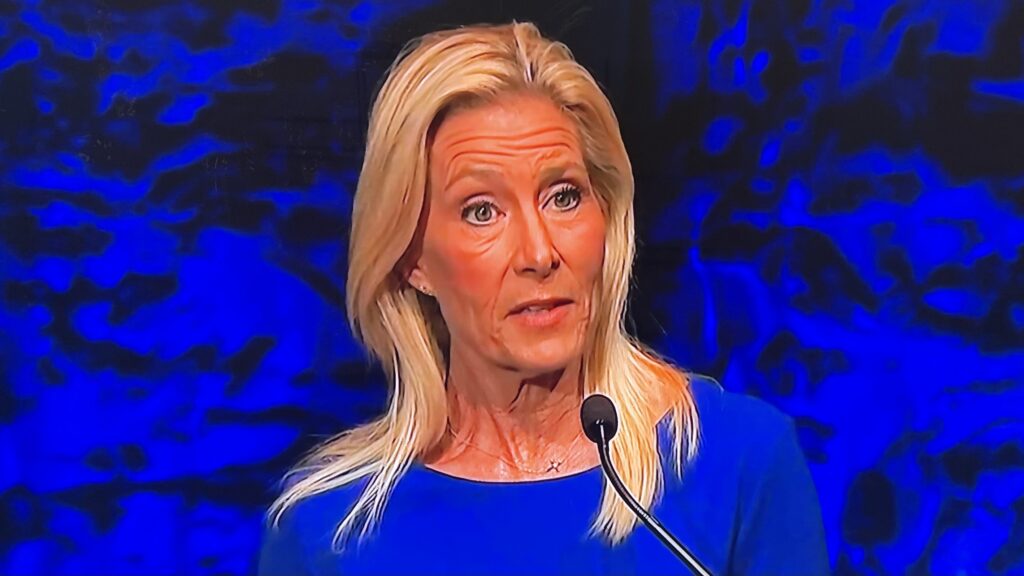
Candidate bio: As a 25-year veteran broadcast journalist and former lead anchor of First Coast News, Deegan listened to and shared stories of people living in many corners of the city and reported on what she calls “the systemic problems that exist within our communities.” After being diagnosed three times with breast cancer, she founded the DONNA Foundation, a nonprofit dedicated to supporting breast cancer education, outreach, and treatment for underinsured women in Northeast Florida. Deegan’s roots in Jacksonville trace back generations, and she is motivated to continue her family’s legacy of service “by making Jacksonville a city that works for all of its residents.” (Info from Deegan’s campaign)
On top priorities: “It starts with finally, finally fixing the broken infrastructure, the neglected infrastructure in this city, and keeping the broken promises that we have been making to our neighborhoods in this city for 55 years. We’ve got to finally fix the drainage, we’ve got to fix the septic tanks, and so much else. The second pillar is health. We have the absolute worst health outcomes for primary health in the state of Florida. I have a four-point plan to deal with that and to bring us back and to create safer, healthier neighborhoods. And finally, we need to rev the engines of small business in this community, and I have a plan to bring everybody into this economy instead of just a select few, like we do now.”
On public safety: “We have a murder rate that is four times per capita that of New York City. That is just shameful and something that we can’t have. Our citizens deserve better. I have said repeatedly — regardless of what you may hear on television — that I will fully fund our police, that I will put more officers on the streets because I’ve seen the data that supports that we need more officers on the streets. But I’ll go further than that, I’ll make sure we’re getting underneath the causes of crime, especially violent crime. And when you look at programs we’ve had in the past, like the Jacksonville Journey that bring in issues like literacy, and food deserts and poverty, and other issues that can help us to mitigate a life of crime for people, what we have seen in the past is a dramatic drop in violent crime. So we must put officers on the streets. But we must do more than the same old same old to bring those numbers down.”
On allocating funds for JSO: “I think almost half of our budget goes to our police officers. So we have a lot of money that goes toward police, but I would suggest that if we spent more time on intervention and prevention, we could save some money on the back end. … When I visited the jail several months ago, I talked with a lot of the folks who have worked there for many years, who have seen a lot of young people whose lives really are lost to a life in prison. And what they told me over and over again, is that we could save so much money, both in housing people in jail and in the lives that are lost, if we would invest in some of our wonderful intervention and prevention programs. So I’d like to see us spend a lot more energy and money on those than we do now.”
On a citizen’s review board that would oversee JSO: “In 2017, the Supreme Court of Florida said that there cannot be a civilian review board that has any sort of authority over police. So that was always a nonstarter. What I have said from the very beginning, is that if we are going to have a safer city, we need to make sure we are having better communication with our police officers and our citizens. We decided to reject the Safer Together committee that we had in the city when the conversations got difficult. We need difficult conversations. We need those uncomfortable conversations between citizens and police to move us forward. So a citizen review board would simply serve — it could even be a panel of retired judges — but it cannot be a panel that has any sort of authority over police. It’s simply a means of making us safer by creating better conversation and yes, better accountability.”
On revitalizing Downtown: “The very first thing that we have to do is to fix our crumbling infrastructure, and that starts with Downtown. Our sidewalks, our streets, our bulkheads, all the things that are truly crumbling. … We talk about the 10,000-person threshold for development, for that thruster to start, but right now, we have taken that definition and we’ve moved it all the way around to Brooklyn, all the way around to the Shipyards. So what we really need is about 30,000 people. How do we do that? Well, we fire the engines of our small business community that’s really been left behind by the city. We give them the tools to be successful, and we want to bring them Downtown. But we do want to bring more workforce housing. In fact, we want to bring everybody Downtown and have a thriving open riverfront as well.”
On Jaguars stadium funding: “We are going to bring in the best negotiators to do that work. We’re going to bring in the people who are certainly used to negotiating with the NFL on deals like this and we’re going to create a deal that works best for the citizens of Jacksonville. … I also want us to keep that stadium, there are a lot of things that we can do with it. We need a long term lease with the Jaguars, but we also need to make sure that we’re creating a deal that doesn’t open the pocketbook, like we’re doing right now with everything the Jaguars always want, but that actually creates a deal that works for the taxpayers and for the citizens of Jacksonville — plus the Jaguars and the NFL.”
On investing in Jacksonville’s North and West sides: “I’m a proud Southside resident. When I was growing up, I grew up over there. But you can’t give everything to one part of town, and I think that we have had folks on the Northside and on the Northwest side who will tell you that around election time, every single four years, they get told that we’re finally going to take care of the drainage, we’re finally going to take care of the septic tanks, we’re finally going to give them the same economic and job opportunities that are available to people in the other parts of the city. So what I’m going to do is have a very intentional focus on our minority business owners who are missing out on some of the same type of facade grants and business tools that other people in this city have.”
On building a UF campus in Jacksonville: “I love the idea of being able to bring a campus like that Downtown. I think there are other campuses, University of North Florida, [Jacksonville University], others that would like to talk about those types of things too. In terms of the public dollars, I don’t have a problem with public dollars going into that; I also would like to see more private investment. But at the end of the day, to have a UF campus Downtown would be a wonderful thing, I would just love to have more details on that. It’s hard to talk about committing that kind of money without greater detail about what that’s actually going to provide and what that’s going to bring back to the city of Jacksonville.”
On continuing the Florida/Georgia game contract: “I think it’s a wonderful tradition in Jacksonville. It’s been going on for so long and people in the city absolutely love it. It brings a lot of national eyeballs to Jacksonville and I think that it’s something that’s worked for both the University of Florida, the University of Georgia and for the city of Jacksonville. I think we have to negotiate a deal that works for everybody in that situation, but I think we can.”
On privatizing JEA: “If we lose JEA – you want to talk about defunding stuff, you’re going to be defunding our parks, you’re going to be defunding our utilities, our public safety, you’re going to be defunding our firefighters, you’re going to be defunding everything. We get a lot of money from JEA and we cannot give that up. … The man running [Davis’] campaign [Tim Baker] was mentioned 44 times in the JEA report. [Davis] has been in on this from the very beginning, and if you believe he will not sell our utility when given the opportunity, I’ll tell you what, I got some oceanfront property in Arizona that I’ll sell ya.”
On septic tank phase out: “There are 22,000 of them that sit along the water line, that seep into our water and make our citizens sick. And what we hear over and over again: ‘Oh, you can’t do it.’ We put $50 million in the budget, we halved that to $25 million. Why? Because what we’re hearing is we can’t convince people to take them out. Well, then you know what? Start an education program. Make sure that people understand the importance of it, and most people want those septic tanks removed. And the city has kicked the can down the road on it for so many years. It’s got to become a priority, we’ve got to get them out of there. … We should not be using septic tanks in the city, especially a city on the water with so many vulnerable waterways.”
On pedestrian safety: “We need to create a lot more walkable, bikeable areas in our city. I love the fact that we have that new pedestrian area that goes across the Fuller Warren Bridge. That’s fantastic. We need a lot more of that, but we need to be creating our infrastructure intentionally in that way as well. I love the Emerald Trail project, I believe that’s going to be an opportunity to connect neighborhoods with places where people will want to walk and ride and be connected with places where they won’t have to get in their cars all the time. But part of the solution to this is we want to get some of the cars off the road, right? So I like the idea of creating road diets in some areas, where we can create more sidewalks, more areas where pedestrians and bikers can be so that we’re not overcrowding our roads any more than we have to.”
On Confederate monuments: “I think any monument that denies the humanity of any group of people should go. So the bottom line is, though, I know there are people that would like to preserve them for history and I think that’s okay. We can remove them, we can put them in a museum, we can put them in context, but they cannot sit in the middle of a neighborhood where people are living, where they’re a constant reminder of hate. … I would spend public money — just as our current mayor has said he would do — to remove those Confederate monuments to make sure that people don’t have to walk by them and be reminded of a time in our history that, quite frankly, we should be ashamed of.”
On affordable housing: “It really is a crisis for folks and just like with everything else in this city, from infrastructure to healthcare to our economic development, we leave hundreds of millions of dollars of federal and state grant money on the table. We need to make sure we’re going up and bringing down that money and using it for things like affordable housing. … We do need more housing, we need to change our zoning in some areas to create more multifamily housing. That’s a part of the way we can solve that problem. We also need to make sure that we’re dealing with these out-of-state folks that are coming in here and buying up properties and jacking up the rents and creating a situation where we’re robbing people of their generational wealth. … I also think we should ask our developers if they’re going to get city incentives, you need to set aside some of those units for affordable housing.”
On the Black Lives Matter movement: “The truth is, a lot of mamas like me saw George Floyd screaming for his mother and for his life when he was being murdered and a lot of us — including our sheriff and our mayor were out in those marches. I was never involved in a violent march. I support Black lives. I understand that there are people that are involved at the top of that movement that are not good people, but I’m just going to tell you — that movement was about racism. It was not about that movement. It was about racism and it was about George Floyd. And we had promises made to the people in this community that things were going to change. I want to know what’s changed. That’s why I say we need better communication between our police and our residents.”
On homelessness and panhandling: “I don’t like the idea of criminalizing folks who need help. I know we don’t want them out on the streets and I know it is not safe, but what we need to do is we need to invest in the services, some wonderful nonprofits that we have here and my public health program where I will have a public health physician, that creates a scenario where we bring down more federal dollars for our nonprofits. One of those things would be for mental health — and we can create an education program around that — and they connect people to those services. It’s incredibly important that we get underneath why these things are happening.”
On veterans’ services: “What they have asked for for many, many years in this city is a community center. They believe that what they need more than anything else is an ability to connect with one another. They believe nobody else understands their pain and what they’ve been through like a fellow veteran, and they believe that they had a place to gather, that would be an opportunity for them to heal. And so when I have met with them, myriad times, they have said to me that in addition to just wanting what every other citizen in Jacksonville wants, which is an opportunity, they would like a place to gather.”
On Jacksonville on the national stage: “I think the biggest issue we have in this city right now is our culture — and we are actually renowned around the country for our culture of corruption in this city. There are a lot of people that don’t like to do business here because we have a zero-sum-punishment politics sort of system here in Jacksonville. We have folks that have been in charge in this city for far too long, the same folks running [my opponent’s] campaign, who will be in his administration that are running the city right now. Those folks just give deals to their friends and their donors. And let’s be honest, the big developers in this city — they know who their friend is, right? But it’s only a certain amount of them, there’s certain ones that get everything in this city. We need to change the culture of this city. We have to bring more small businesses in. We need to bring others in who have been left behind and open up the transparency.”
Campaign cash: $1.6 million (includes $712,354 reported to Duval elections and $894,174 to her PAC, Donna For Duval).
Candidate website: Donna Deegan for Mayor.


